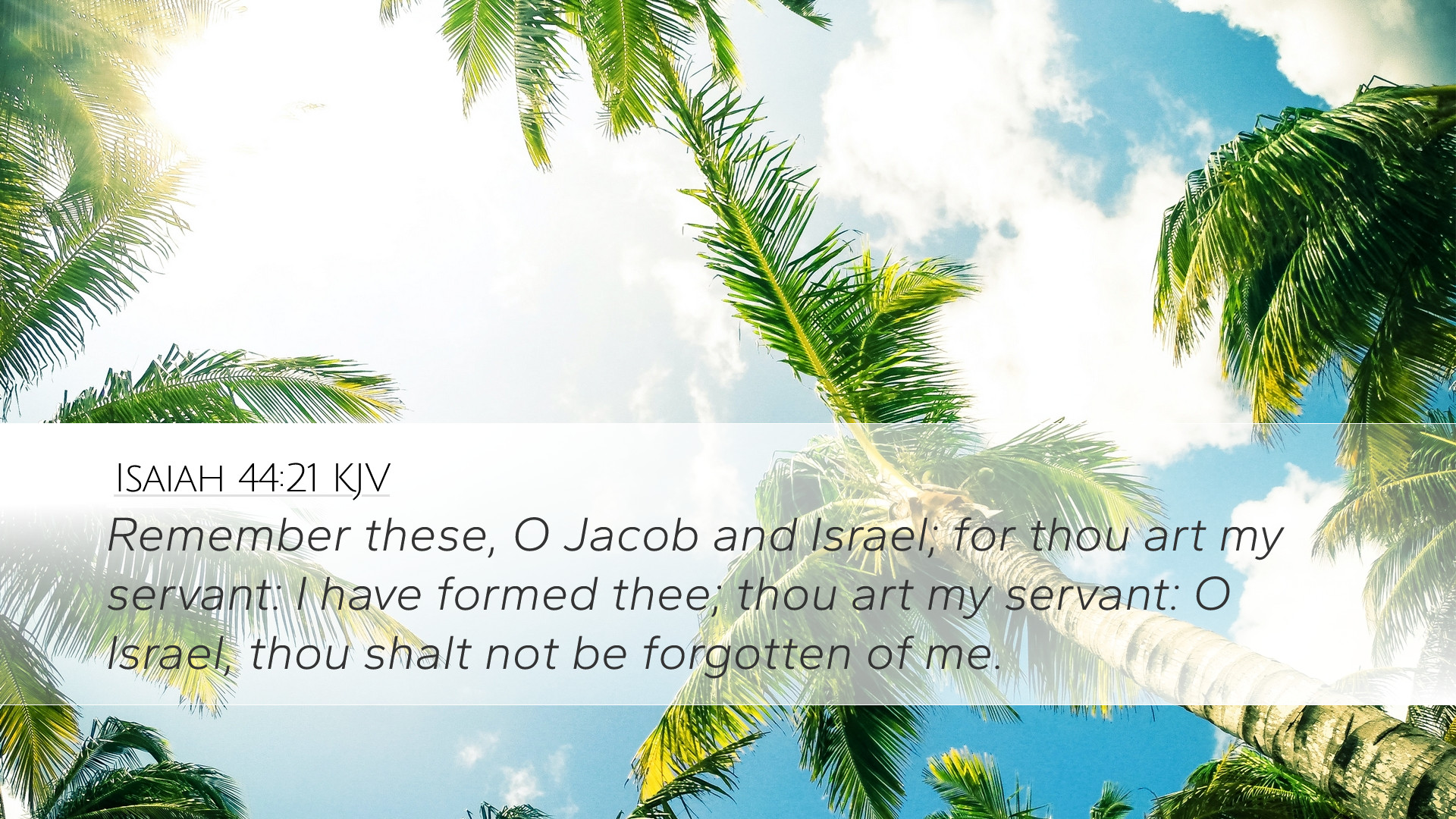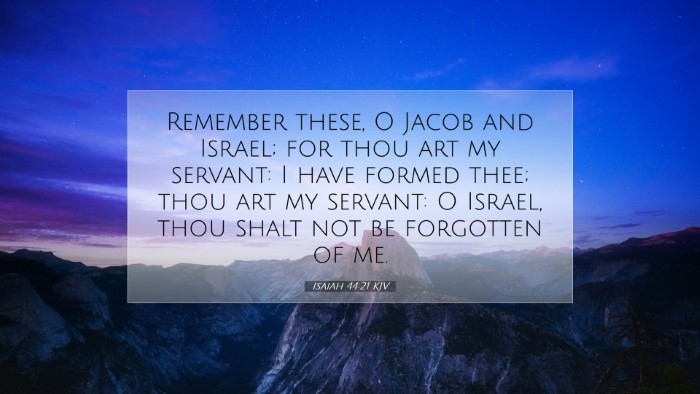Commentary on Isaiah 44:21
"Remember these, O Jacob; and Israel, for thou art My servant: I have formed thee; thou art My servant: O Israel, thou shalt not be forgotten of Me."
Introduction
Isaiah 44:21 is a crucial verse in God's message of comfort to His people Israel. This verse encapsulates themes of remembrance, divine formation, servitude, and the assurance of God's enduring commitment. Commentators such as Matthew Henry, Albert Barnes, and Adam Clarke provide rich insights into these profound themes. This commentary aims to synthesize their perspectives to deepen the understanding of this verse, making it applicable for pastors, students, theologians, and Bible scholars.
Historical Context
The book of Isaiah is written during a tumultuous period in Israel's history, characterized by exile and oppression. Isaiah prophesies that despite their current suffering, God remains faithful to His covenant with Israel. This message becomes particularly poignant as the Israelites grapple with their identity and God's promises amidst their challenges.
Key Themes
- Divine Remembrance: Isaiah urges the people to remember their identity as God's chosen ones.
- Servant Identity: The repeated mention of the term "servant" emphasizes Israel's purpose and calling.
- God's Sovereignty: The assurance that Israel is formed by God highlights His sovereign role in their existence.
- Divine Commitment: God’s promise not to forget His people encapsulates His unchanging nature and loyalty.
Verse Analysis
Divine Remembrance
Matthew Henry emphasizes the significance of memory in spiritual life. God admonishes Israel to remember who they are and to whom they belong. This call is not merely historical but a spiritual imperative; it serves to recharge their faith in God's promises. The act of remembering can often lead to renewal in the heart of believers.
Servant Identity
Albert Barnes elaborates on the notion of servanthood in this verse. The title of “servant” carries profound implications, detailing a relationship of obedience and dedication to God. Israel’s identity as servants means they are called to fulfill God's purposes on Earth. This title also reinforces the collective identity of the nation, grounding their calling in a shared mission.
God's Sovereignty
Adam Clarke highlights the creative power of God in forming Israel. The phrase, "I have formed thee," speaks not only to physical creation but also to God's intimate involvement in the life of Israel. They are not a mere collection of people but a meticulously crafted nation with divine intention. Clarke notes how this notion serves as an eschatological reminder of God's preordained plan for His people.
Divine Commitment
The closing assurance that “thou shalt not be forgotten of Me” resonates with comfort. Matthew Henry explains that God's memory is not like human memory—which can fade or fail—rather, His remembrance is an active engagement in the lives of His people. This promise implies that even in their darkest moments, God's love and purpose for Israel remain steadfast, providing deep hope and encouragement.
Theological Implications
This verse holds substantial theological implications. It presents a clear understanding of God's relationship with His people, characterized by fidelity and active remembrance. For modern believers, these themes reaffirm the unbreakable bond between God and humanity, transcending historical context.
For Pastors and Leaders
This verse serves as a reminder for church leaders about the importance of guiding their congregations to remember their identity in Christ. The call to servanthood can foster a community of humble service and mission-driven focus within the church. The assurance of divine commitment can be a powerful tool in preaching, providing hope in challenging times.
For Students and Scholars
For students and scholars, the depth of this verse offers a rich field for theological exploration. The interplay of memory, identity, and God's sovereignty invites further study into the nature of God's covenant and the implications of servanthood in contemporary faith communities. Textual analysis of Isaiah in its historical context could yield further insights into the overarching narrative of redemption within Scripture.
Conclusion
Isaiah 44:21 serves as a powerful reminder of God's unwavering commitment to His people. The insights drawn from public domain commentaries provide a multi-faceted understanding of this verse, encouraging a deeper reflection on the themes of remembrance and servanthood. As we grapple with our identities and purposes today, this verse continues to resonate, inviting us into a deeper relationship with our Creator.


